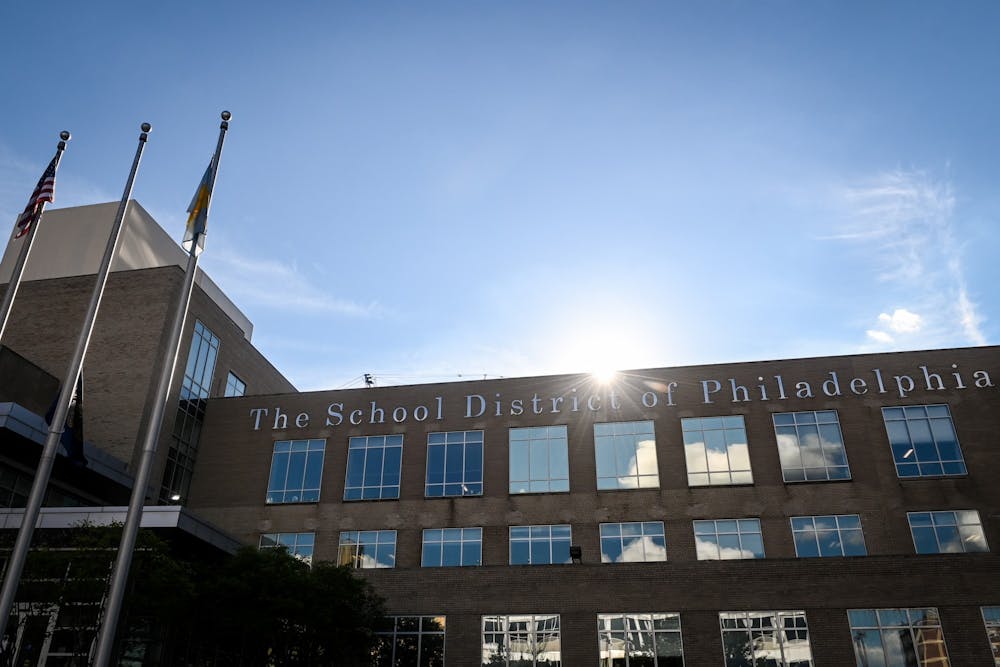Penn will contribute $100 million to the School District of Philadelphia over the next 10 years, the largest private contribution in the school district's history.
The announcement comes as the University faces widespread criticism from both students and faculty for its refusal to make Payments in Lieu of Taxes, known as PILOTs, to the city of Philadelphia. As a nonprofit institution, Penn is exempt from paying property taxes to the city. But universities often voluntarily pay PILOTs to support public services, like school systems.
In an email sent to the Penn community Tuesday afternoon, Penn announced that the University will contribute $10 million annually over the next decade to address environmental hazards in Philadelphia's schools, including asbestos and lead. The contribution was announced by Penn President Amy Gutmann, Philadelphia Mayor Jim Kenney, School Board President Joyce Wilkerson, and Superintendent of the School District of Philadelphia William R. Hite, Jr.
"Nothing is more important than the health and welfare of our children, and few things are more crucial to a community than the safety and quality of its public schools,” Gutmann said in the University email. “When Philadelphia’s schools and schoolchildren succeed, all Philadelphia succeeds."
Since October 2019, 11 Philadelphia schools have closed because of the asbestos crisis. Hite told CBS3 Philly in February that about 80% of Philadelphia schools were built before 1978 and are likely to contain asbestos, adding that a lack of financial resources hindered the district's ability to mediate the crisis.
The School District of Philadelphia announced an Environmental Safety Improvement Plan in November 2019 to respond to these environmental hazards, and in January 2020 allocated $41 million for asbestos testing, abatement, project management, and other remediation efforts, the email stated.
“We are thrilled to have this very generous contribution from the University of Pennsylvania,” Hite said in the email. “It will be a great support as we move forward to address the immediate environmental conditions in all of our schools. This will allow us to shift our focus to creating 21st century learning environments for all students.”
Despite not paying PILOTs, Penn has consistently asserted that the University makes other substantial non-monetary and financial contributions to Philadelphia schools.
Penn’s history of refusing to pay PILOTs, explained
Penn faculty challenge Penn to pay PILOTs ahead of Thursday Board of Trustees meeting
Tuesday's email stated that Penn has contributed more than $25 million over the past 15 years to the Penn Alexander School in Philadelphia, providing land and funds for operations and construction. The University also offers non-monetary assistance through programs led by the Graduate School of Education to the Henry C. Lea Elementary School and offers more than 500 activities in 248 schools throughout Philadelphia, according to the email.
For years, students and faculty have engaged in protests and activism to demand that Penn pay PILOTs.
In 2015, the Student Labor Action Project marched through campus, and in 2018, students interrupted a University Council meeting, both to urge Penn to pay PILOTs. Penn for PILOTs, an effort led by faculty and staff, has collected more than 1,100 signatures from University faculty and staff members urging Penn to pay PILOTs in light of the COVID-19 pandemic, which forced the school district to make budget cuts.
"Philadelphia is our home. Education is at the very heart of all that we do at Penn, and we will continue to ensure that we are doing all that we can to support the success of public education in Philadelphia," Gutmann wrote in the email.









